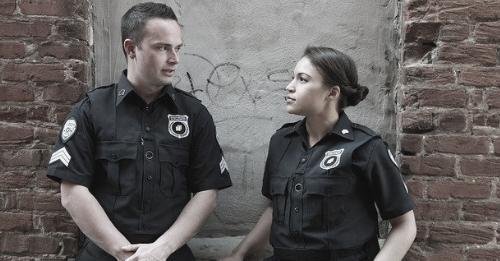How Mindfulness Helped Me Become a Better Police Officer

By Michelle Palladini, guest contributor
Today’s society offers countless ways to improve yourself, and the wave of mindfulness has come in like a tsunami in recent years. Many look towards mindful practice as a way to step back, regroup, and manage the thoughts/feelings/emotions that surface during the day. While mindfulness is an important tool, it’s just the vessel that keeps you afloat so you can communicate, connect, and lead effectively (it’s not actually about you).
The organizational impact of mindfulness is something to reflect on as a leader. How is your practice growing authenticity, compassion, and responsiveness? It’s great if you meditate daily and develop a sense of inner peace, but how is this translating into your interpersonal relationships? How is this making you a more effective leader?
Let’s break down the concept of leadership. Simon Sinek shares that the top three qualities of a leader are selflessness, empathy, and grace under fire. Mindful practice can help you embody these traits by becoming more aware of your own emotions so you can recognize the same in others. Elizabeth Kingsbury, in her study “The Relationship Between Empathy and Mindfulness: Understanding the Role of Self-Compassion” found that high levels of mindfulness increased perspective taking (empathy) and lowered levels of personal distress (self-compassion). This is how you embody a personal mindfulness practice as a leader, by taking your practice off the cushion and noticing/actualizing community benefit.
When I began practicing mindfulness as a young police officer, my relationship with the people I served drastically improved. I remember the day I realized I had changed. I was called to assist a young man named Dan* who was high on drugs, emotionally distraught, and destroying items in his home. In the past, I would’ve walked into that situation on high alert; heart-pounding, fists clenched, ready for the fight. Instead, I walked in calmly (grace under fire), and spoke to the young man as a person. This wasn’t about me; it was about Dan in his time of need. I knew right then and there that I could be a calming presence, or a controlling authority figure, my choice (selflessness). Maybe I didn’t know what it was like to be addicted to drugs, but I could recall a time I felt so depressed and dysregulated that I would’ve done anything to quell those feelings (empathy).
In the end, Dan felt seen and heard and I was able to connect him with resources thanks to some of my community partnerships. None of that would’ve been possible without my mindfulness practice; the newfound ability to see him as a person, just like me. I had the mental space and compassion to support him, as opposed to dismissing him as yet another “drug addict.” The ongoing practice of non-judgment moved from myself to others, and this shared experience of humanity taught me that compassion is the answer.
I’ve learned it’s not enough to feel sympathy for someone, it’s about taking action. The very definition of compassion is to see another’s suffering and have a desire to relieve it! I remember feeling bad for Dan and wanting to help, however my skill set was limited as a police officer. I knew that I couldn’t counsel him, or work with his insurance company to get him better healthcare providers, but I could connect him with the wonderful people at our Substance Abuse Coalition who had the answers! I could be a bridge and a partner in-service.
I encourage you to take your practice out into the world as a leader. Mindfulness teaches you to pay attention to the present moment, without judgment, so you may take strategic action that’s rooted in moral courage. How can you do this in the workplace? Remember MOVE:
M - Mindful
O - Operation of
V -Valiant
E - Effort
Let’s break that down further:
Mindfulness is simply present moment attention, without judgment. Once you’ve established a foundation of mindfulness, you can operate heart and mission forward, taking strategic action that’s rooted in a valiant effort. Quite simply, it’s about acting with integrity; doing the right thing, humbly, for your fellow humans. This is how we move forward as leaders, and as a society.
We remember it’s about not about “me,” it’s about “we.”
*Name has been changed.
Michelle Palladini is a police detective in Massachusetts, founder of the L.E.A.P. Program, police trainer, and certified yoga, meditation, and mindfulness teacher. She is a highly sought-after speaker
Click here to sign up for our newsletter to stay up to date, get special offers, curated articles, free videos & more.

0 comments
Leave a comment